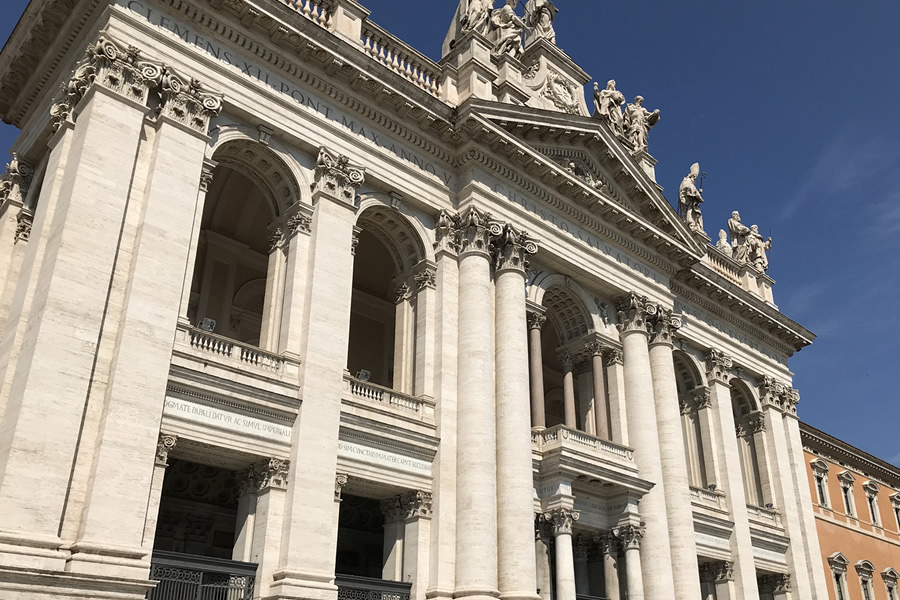St. Francis of Assisi Weekly Reflections

Lateran Basilica
11-09-2025Weekly ReflectionWe Celebrate Worship Resource, Vol. 50, No. 3In today’s first reading, Ezekiel relates his vision of a remarkable temple, built in a restored Jerusalem. The water flowing from this temple miraculously makes salt water fresh. By his description, his audience knew he was speaking of the Dead Sea, whose toxic waters cannot support any life visible to the naked eye. But in Ezekiel’s vision, the temple’s water purifies this sea, enabling trees on its banks to grow and bear fruit, bringing life to what is literally called “dead”. His vision symbolizes a life-giving waters of baptism that flow from all churches. Those waters have certainly flowed from the Lateran Basilica, which was built in 324 CE—soon after Emperor Constantine legalized Christianity—and is regarded as the mother church of all churches in the world. In today’s Gospel, Jesus takes it one step further when he refers to his body as a temple, the dwelling place of God, which God will raise to new life in the Resurrection. Paul tells the church at Corinth that they are God’s building, for the Holy Spirit dwells in them. So too are we temples of God, dedicated in baptism to glorifying the Holy Spirit flowing out from us.
How can what you say and what you do bring life to those around you, like the life-giving waters that flow from the temple in Ezekiel’s vision?
Basilica de Letrán
En la primera lectura de hoy, Ezequiel relata su visión de un templo extraordinario, construido en una Jerusalén restaurada. El agua que fluye de este templo convierte milagrosamente el agua salada en agua dulce. Por su descripción, su audiencia sabía que hablaba del Mar Muerto, cuyas aguas tóxicas no pueden sustentar ninguna vida visible a simple vista. Pero en la visión de Ezequiel, el agua del templo purifica este mar, permitiendo que los árboles en sus orillas crezcan y den fruto, dando vida a lo que literalmente se llama "muerto". Su visión simboliza las aguas vivificantes del bautismo que fluyen de todas las iglesias. Ciertamente, esas aguas fluyeron de la Basílica de Letrán, construida en el año 324 d. C., poco después de que el emperador Constantino legalizara el cristianismo, y considerada la iglesia madre de todas las iglesias del mundo. En la lectura de hoy, Jesús va un paso más allá al referirse a su cuerpo como un templo, la morada de Dios, que Dios resucitará a una nueva vida en la Resurrección. Pablo les dice a los corintios que son edificio de Dios, porque el Espíritu Santo habita en ellos. Así también nosotros somos templos de Dios, consagrados en el bautismo a glorificar al Espíritu Santo que emana de nosotros.
¿Cómo pueden tus palabras y acciones dar vida a quienes te rodean, como las aguas vivificantes que fluyen del templo en la visión de Ezequiel?
God's House
11-09-2025Question of the WeekReading I Ezekiel 47:1-2, 8-9, 12 – The Wonderful Stream
Reading II 1 Corinthians 3:9c-11, 16-17 – You Are God’s Temple
Gospel John 2:13-22 – Cleansing of the Temple
Key Passage: ““Do you not know that you are the temple of God, and the Spirit of God dwells in you?” (1 Corinthians 16)
Adult: In what ways can you better honor and care for your body, God’s holy temple?
Kids: How can you take good care of your body, since it is God’s house?
La Casa de Dios
Lectura I Ezequiel 47:1-2, 8-9, 12 – El arroyo maravilloso
Lectura II 1 Corintios 3:9c-11, 16-17 – Ustedes son el templo de Dios
Evangelio Juan 2:13-22 – La purificación del templo
Pasaje clave: “¿No saben acaso ustedes que son el templo de Dios y que el Espíritu de Dios habita en ustedes?” (1 Corintios 16)
Adultos: ¿De qué maneras puedes honrar y cuidar mejor tu cuerpo, el santo templo de Dios?
Niños: ¿Cómo puedes cuidar bien tu cuerpo, ya que es la casa de Dios?
All Souls
11-02-2025Question of the WeekReading I Wisdom 3:1-9 . The Souls of the Just
Reading II Romans 5:5-11 . Christ's Death for Us
Gospel Matthew 5:1-12a . Eternal Life
Key Passage: "For this is the will of the Father, that everyone who sees the Son and believes in him may have eternal life, and I shall raise him up on the last day." (John 6:40)
Adult: How have those you have known who have died taught you how to live a holy life?
Kids: How can those who died help us learn to be more like Jesus? Ask an adult to tell you stories of someone they knew.
Todos los Fieles Difuntos
Lectura I Sabiduría 3:1-9 . Las almas de los justos
Lectura II Romanos 5:5-11 . La muerte de Cristo por nosotros
Evangelio Mateo 5:1-12a · Vida eterna
Pasaje clave: "Porque esta es la voluntad del Padre: que todo aquel que ve al Hijo y cree en él, tenga vida eterna, y yo lo resucitaré en el día postrero." (Juan 6:40)
Adultos: ¿Cómo te han enseñado a vivir una vida santa aquellos que has conocido que han fallecido?
Niños: ¿Cómo pueden los que han fallecido ayudarnos a aprender a ser más como Jesús? Pide a un adulto que te cuente historias de alguien que haya conocido.

Hope Does Not Disappoint
11-02-2025Weekly ReflectionWe Celebrate Worship Resource, Vol. 49, No. 1On this day when we remember in a special way all those who have died, let us also reflect on the theme of this Jubilee Year: Pilgrims of Hope. Our lives are a pilgrimage and because of our faith in a God who loves us, forgives us, and saved us, we are able to remain ever hopeful; for ourselves and for all.
We are hopeful because we believe that our pilgrimage through life does not end in death but in eternal life with the Lord. To those who cannot see past this life here on earth, death is truly an "affliction," an "utter destruction" (Wisdom 3:2-3). Though we surely grieve at the passing of loved ones, for we feel a tremendous sense of loss, we console each other with our trust that God has prepared a home for our loved ones and for us and will raise us all on the last day.
This gives us hope, precious hope, which "does not disappoint" (Romans 5:5). We do not know, we cannot know, what the future holds for us, but our hope in eternal life in God's kingdom can reassure us as we struggle through the tragedies and hardships of life, particularly the suffering and grief that come with death itself.
How does hope help you cope with pain, suffering, and grief?
-We Celebrate Worship Resource, Vol. 50, No. 3
La Esperanza No Desilusiona
En este día, en que recordamos de manera especial a todos los fallecidos, reflexionemos tambien sobre el tema de este Año Jubilar: Peregrinos de la Esperanza. Nuestras vidas son una peregrinación y, gracias a nuestra fe en un Dios que nos ama, nos perdona y nos salva, podemos mantener siempre la esperanza; por nosotros mismos y por todos.
Tenemos esperanza porque creemos que nuestro peregrinar por la vida no termina en la muerte, sino en la vida eterna con el Señor. Para quienes no pueden ver más allá de esta vida terrenal, la muerte es una verdadera "aflicción", una "perdición total" (Sabiduría 3:2-3). Aunque sin duda lamentamos la pérdida de seres queridos, pues sentimos una tremenda sensación de pérdida, nos consolamos mutuamente con la confianza de que Dios ha preparado un hogar para nuestros seres queridos y para nosotros, y que nos resucitará a todos en el último día.
Esto nos da esperanza, una preciosa esperanza que "no defrauda" (Romanos 5:5). No sabemos, no podemos saber, qué nos depara el futuro, pero nuestra esperanza en la vida eterna en el reino de Dios puede tranquilizarnos mientras luchamos contra las tragedias y dificultades de la vida, particularmente el sufrimiento y el dolor que vienen con la muerte misma.
¿Cómo ayuda la esperanza a afrontar el dolor, el sufrimiento y la pena?
-We Celebrate Worship Resource, Vol. 50, No. 3